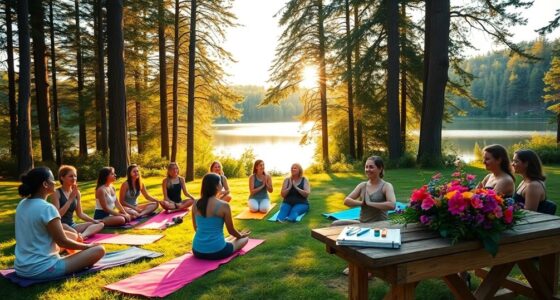To prepare your mountain cabin retreat off-grid, assess the terrain and weather conditions regularly to stay safe. Set up reliable power sources like solar and backup batteries, and secure a steady water supply through rain harvesting, filtration, or well systems. Stock up on preserved foods, cooking gear, and safety equipment such as first aid kits and fire extinguishers. Pack versatile outdoor clothing and navigation tools for all seasons. If you keep exploring, you’ll discover how to make your retreat truly self-sufficient and secure.
Key Takeaways
- Regularly monitor weather and terrain conditions to prepare for rapid changes and identify hazards.
- Utilize renewable energy sources like solar and wind, with backup power solutions and water filtration systems.
- Ensure proper insulation, sealing, and weatherproofing for shelter comfort and energy efficiency in varied climates.
- Equip with reliable communication devices, GPS navigation, and appropriate outdoor gear for safety and navigation off-grid.
- Maintain emergency supplies, first aid kits, fire extinguishers, and safety protocols for quick response to unexpected situations.
Assessing the Location and Weather Conditions
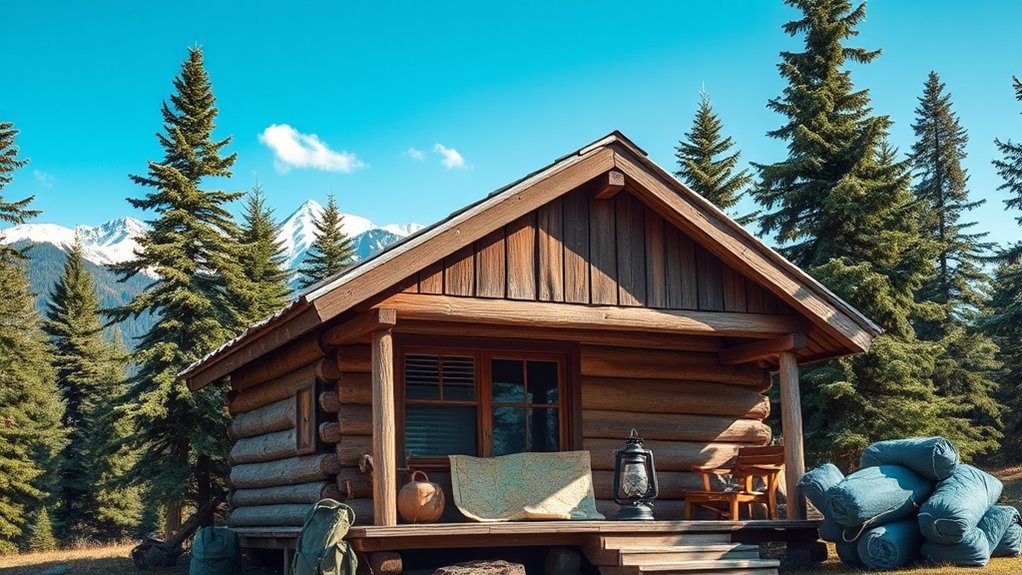
When choosing a mountain cabin retreat, understanding the location and weather patterns is essential for a safe and enjoyable stay. You need to analyze mountain weather forecasts regularly, as conditions can change rapidly. Terrain analysis helps you identify potential hazards like steep slopes, rockfalls, or flood-prone areas. Knowing the terrain also guides you in planning safe routes and outdoor activities. Consider the altitude, as higher elevations often mean colder temperatures and increased snowfall. Research the local climate to anticipate weather extremes and seasonal patterns. Being aware of weather trends and terrain challenges allows you to prepare appropriate gear, plan for emergencies, and avoid risky situations. Additionally, understanding celebrity transformations can inspire creative ways to adapt your retreat setup for comfort and style. Proper assessment guarantees you enjoy your retreat comfortably and safely, regardless of weather surprises.
Essential Off-Grid Power Sources and Backup Plans
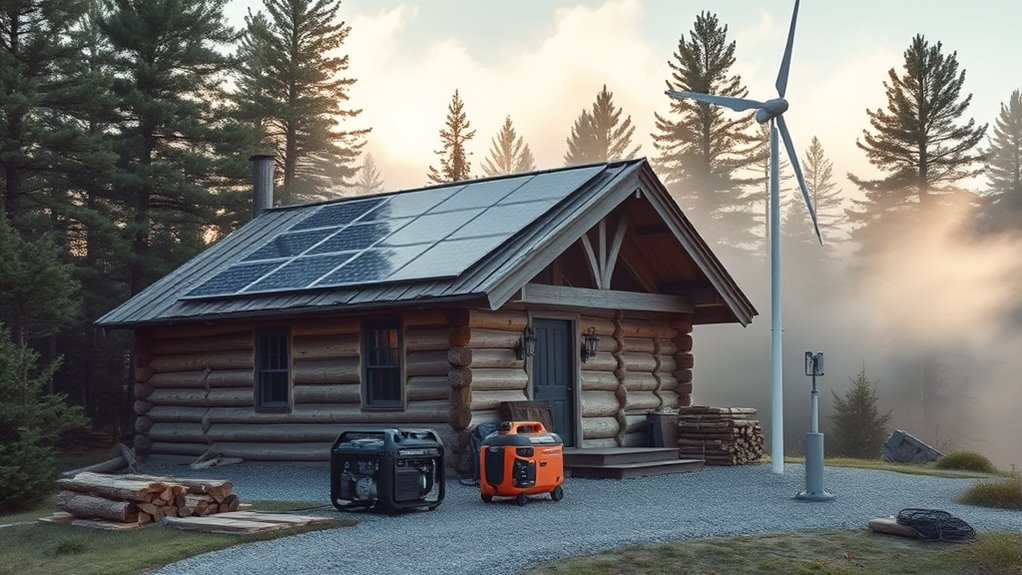
Having reliable off-grid power sources is essential for ensuring your mountain cabin remains functional and comfortable, especially in remote locations where grid access is unavailable. Solar power is a popular choice, providing clean energy during sunny days and being easy to install. Wind turbines can supplement solar, especially if your area experiences consistent wind, ensuring a steady power supply. Combining both options creates a more resilient system, reducing the risk of power outages. It’s wise to include backup plans like portable generators or battery storage systems to cover periods of low sunlight or wind. Regular maintenance and monitoring keep your power sources operational. Planning ahead guarantees you won’t be left in the dark, making your off-grid retreat self-sufficient and enjoyable year-round. Additionally, understanding the importance of high efficiency projectors can enhance your entertainment setup, making the most of your available power resources.
Water Supply and Purification Methods

Securing a reliable water supply is essential for your mountain cabin, especially in remote locations where municipal water isn’t available. You can implement rainwater harvesting to collect and store fresh water. Installing effective filtration systems ensures your water remains safe to drink by removing contaminants. Consider combining methods for added security. Here’s a quick overview:
| Method | Equipment Needed | Benefits |
|---|---|---|
| Rainwater Harvesting | Gutters, storage tanks | Sustainable, cost-effective |
| Filtration Systems | Water filters, purifiers | Ensures water safety |
| Well Water Access | Well drilling, pump | Reliable, consistent supply |
Using these methods together guarantees you’ll have clean, dependable water at your off-grid retreat. Understanding the importance of contamination prevention can help you choose the most effective filtration methods to keep your water safe.
Food Storage, Cooking, and Nutrition Supplies

You’ll want to focus on effective food preservation techniques to keep your supplies fresh longer. Having the right cooking equipment makes meal prep easier and more enjoyable in the cabin. Planning your meals thoughtfully guarantees you get the nutrition you need during your stay. Incorporating traditional butter making techniques can add a special touch to your cooking and ensure you have fresh, homemade butter during your retreat.
Food Preservation Techniques
Effective food preservation is essential when living in a mountain cabin, especially since trips to the store can be infrequent. By using techniques like drying fruits into dried fruits, you extend their shelf life and maintain nutrition. Fermented vegetables are another great option; they not only preserve food but also boost probiotics, supporting your health. Canning and vacuum sealing can help you store meats, soups, and stews safely for months. Freezing is effective, but ensure you have a reliable power source or manual methods like a hand-crank freezer. Properly preserving your food reduces waste and guarantees you have a steady supply of nutritious ingredients. Incorporate a variety of techniques to keep your pantry stocked and healthy, even when access to fresh supplies is limited.
Cooking Equipment Essentials
What essential cooking equipment should you have on hand to prepare nutritious meals in a mountain cabin? You’ll need reliable cookware like pots, pans, and a sturdy knife for meal prep. A portable stove or campfire cooking set is indispensable for indoor and outdoor cooking, especially when preparing campfire recipes. Don’t forget to pack utensils, cutting boards, and heat-resistant tools for safe handling. For outdoor grilling, bring a grill grate, tongs, and a firestarter kit. Food storage containers and airtight jars help keep ingredients fresh and protected from wildlife. A durable cooler is critical for perishable supplies. Proper kitchen organization can streamline meal prep and reduce clutter, making your cooking experience more enjoyable. With these essentials, you can whip up hearty meals, enjoy outdoor grilling sessions, and make the most of your mountain retreat without sacrificing nutrition or convenience.
Nutritional Planning Strategies
Planning your food storage and nutrition supplies guarantees you can prepare balanced meals throughout your mountain retreat. Focus on effective meal planning to ensure you have enough variety and nutrients for your stay. Consider dietary considerations, such as any allergies or preferences, to stock suitable ingredients. Opt for non-perishable foods like canned vegetables, grains, and dried fruits that are easy to store and prepare off-grid. Incorporate versatile ingredients that can be used in multiple meals, reducing clutter and waste. Don’t forget to include essential cooking and nutrition supplies, like spices, oils, and supplements, to maintain a healthy diet. Additionally, staying informed about breakfast delivery options can provide quick and nutritious meal ideas if you need a convenient solution during your trip. Proper nutritional planning helps you stay energized and satisfied, making your mountain retreat more enjoyable and sustainable.
Safety Equipment and Emergency Preparedness
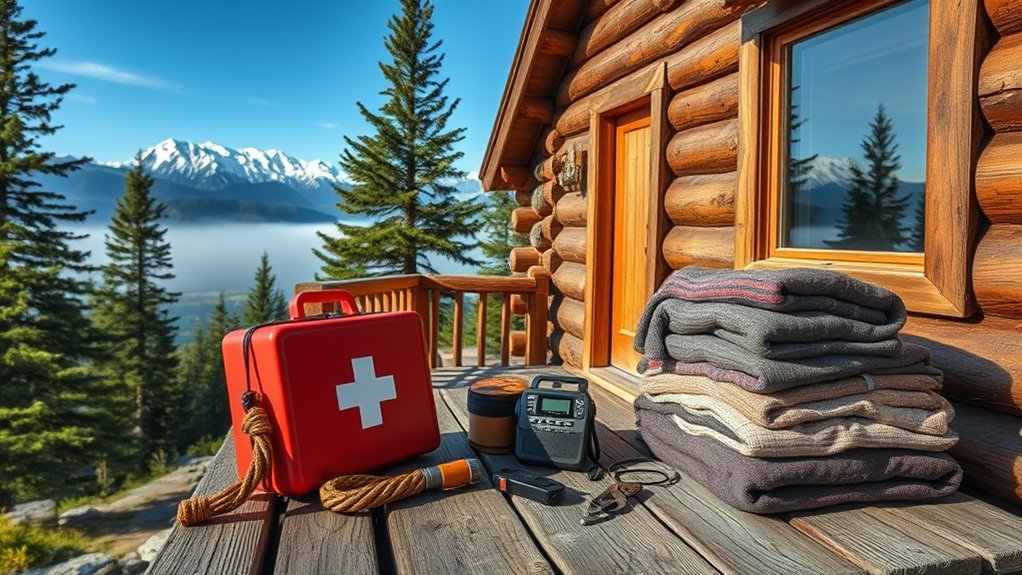
Ensuring you have the right safety equipment and emergency preparedness measures in place is essential for a worry‑free mountain cabin retreat. You need to prioritize personal safety by packing essential emergency kits that include first aid supplies, flashlights, batteries, and multi‑tools. Make sure your emergency kits are well‑stocked and easily accessible in case of injuries or unexpected situations. It’s also wise to have fire extinguishers on hand and know how to use them. Keep a list of emergency contacts and local rescue services nearby. Regularly check your safety gear to make sure everything works properly. Preparing in advance helps you react swiftly, reducing risks and ensuring your safety throughout your mountain escape. Additionally, understanding how to troubleshoot common issues with your headphones can be helpful if you need to communicate or listen to important alerts during your stay.
Communication Tools and Navigation Devices

Having reliable communication tools and navigation devices is essential for a safe and enjoyable mountain cabin retreat. A radio communication device guarantees you can stay connected with nearby rescue services or fellow travelers, even when cell service is limited. Carrying a portable radio allows quick updates and emergency contact if needed. GPS navigation devices help you find your way through unfamiliar terrain, avoiding getting lost. They provide accurate positioning, route planning, and trail tracking, which is especially useful off-grid. Make sure your GPS is fully charged, and consider bringing extra batteries or a portable charger. Combining radio communication and GPS navigation boosts your safety, giving you peace of mind to explore confidently while staying prepared for unexpected situations in remote areas. Enhanced safety features in modern devices can further improve your experience and security during your retreat.
Comfortable Shelter and Sleeping Arrangements
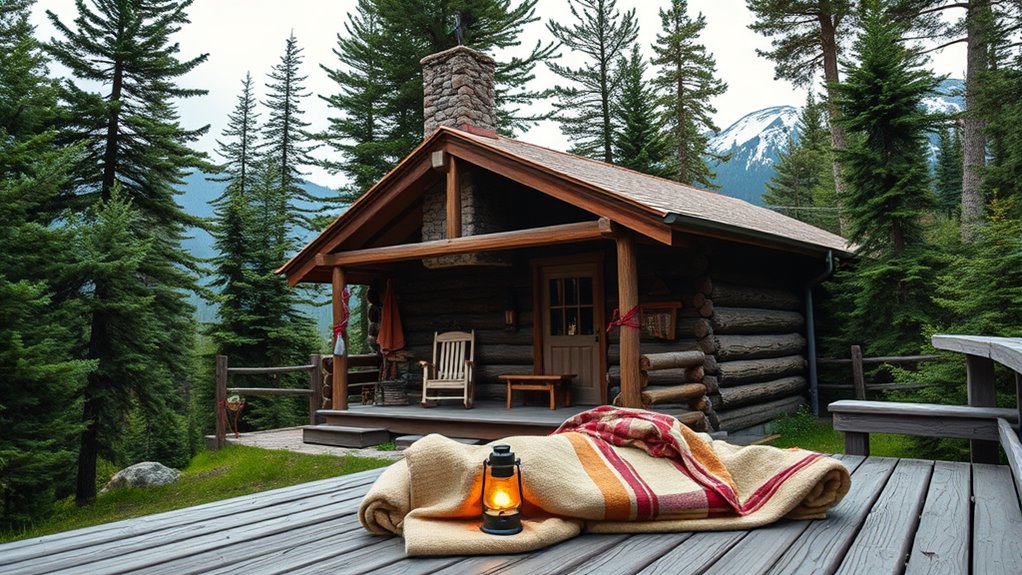
When it comes to your mountain retreat, a cozy bed makes all the difference after a day outdoors. Good insulation and weatherproofing keep you comfortable regardless of the forecast, while portable devices add extra convenience. Together, these elements guarantee you get restful sleep no matter where your adventure takes you. Understanding AI Bifurcation can also help you prepare for emerging technological changes that might affect your off-grid experience.
Cozy Bed Options
A cozy bed can transform your mountain cabin retreat into a true sanctuary of relaxation. To achieve this, choose the right mattress options that provide comfort and support, whether you prefer memory foam, latex, or innerspring. Pair your mattress with luxury bedding—soft sheets, plush blankets, and supportive pillows—to enhance your sleep experience. Consider layering with flannel or fleece for added warmth during colder months. Investing in quality bedding not only boosts comfort but also makes your retreat feel more inviting. Keep your bed area clutter-free and ensure easy access to your essentials for a restful night’s sleep. Additionally, selecting bedding that reflects cultural traditions can deepen your connection to the natural surroundings and enhance your overall retreat experience. With the right combination of mattress options and luxury bedding, your mountain hideaway becomes a haven of peaceful slumber.
Insulation and Weatherproofing
To enjoy restful nights in your mountain cabin, proper insulation and weatherproofing are key to maintaining a comfortable shelter and sleeping environment. Start by installing quality wall insulation to keep heat in during cold nights and block drafts. Use weatherproofing materials like sealants, weatherstripping, and caulking around windows and doors to prevent air leaks. Ensure your cabin’s exterior is well sealed to withstand snow, rain, and wind. Adding insulation beneath floors can also improve warmth and comfort. Regularly check for gaps or cracks and seal them promptly. Good weatherproofing reduces energy loss and creates a cozy atmosphere, making your off-grid retreat more enjoyable and sustainable. Proper insulation and weatherproofing are essential for a snug, protected space in any mountain setting.
Portable Comfort Devices
Ever wondered how to guarantee restful nights in your mountain cabin despite unpredictable weather? Portable comfort devices like solar lanterns and portable fans are essential. Solar lanterns provide reliable lighting without power, keeping your space illuminated and safe. Portable fans help regulate temperature during hot nights, ensuring you stay cool. To maximize comfort, consider these options:
| Device | Benefit | Ideal Use |
|---|---|---|
| Solar lanterns | Off-grid lighting | Inside/outside the cabin |
| Portable fans | Temperature control | Sleeping areas or common spaces |
| Insulated bedding | Warmth during cold nights | Sleeping arrangements |
| Compact heaters | Extra warmth when needed | Backup during cold snaps |
| Sleeping mats | Comfort and insulation | Resting comfortably |
These devices keep your shelter cozy and functional, no matter the weather.
Packing Clothing and Outdoor Gear for All Seasons

When packing for a mountain cabin retreat, planning for all seasons guarantees you’re prepared for sudden weather changes. Layered clothing is key—bring moisture-wicking base layers, insulating mid-layers, and waterproof outer shells to adapt to temperature swings. Don’t forget outdoor gear like sturdy hiking boots, waterproof jackets, hats, and gloves to stay comfortable and protected. Pack versatile clothing that can be mixed and matched, ensuring you’re ready for warm days and chilly nights. Include extra socks and thermal wear for colder weather, and lightweight options for summer. Consider bringing a compact backpack, headlamp, and multi-tool for outdoor activities. Being deliberate about your clothing and gear ensures you’re prepared for anything, making your mountain retreat safe and enjoyable regardless of the weather.
Frequently Asked Questions
How Do I Prevent Wildlife From Entering My Cabin?
To prevent wildlife from entering your cabin, start with effective wildlife deterrents like motion-activated lights and noise makers to scare animals away. Then, focus on cabin sealing by inspecting and sealing gaps, cracks, and holes around doors, windows, and vents. Keep food stored securely and avoid leaving trash outside. These steps will create a barrier, making your cabin less attractive and harder for wildlife to access.
What Are the Best Ways to Handle Medical Emergencies Remotely?
When handling medical emergencies remotely, stay calm, stay prepared, and stay connected. You should have first aid training to provide immediate care, a reliable emergency communication system to call for help, and a well-stocked emergency kit for basic treatments. Keep your phone or satellite device charged and accessible, maintain clear communication with emergency services, and know the quickest routes to nearby facilities. These steps help make certain you’re ready for any unforeseen health crisis.
How Can I Ensure Proper Ventilation and Air Quality?
To guarantee proper ventilation and air quality, you should focus on maintaining good air circulation by opening windows regularly and using fans. Incorporate air filtration systems, like HEPA filters, to remove dust and pollutants. Keep vents clean and check for any blockages. You might also consider installing an air quality monitor to track pollutants and humidity levels, helping you create a healthier, more comfortable living environment.
What Are the Legal Considerations for Off-Grid Living?
When considering off-grid living, you need to understand zoning regulations and property rights. You should check local laws to make certain your plans comply with zoning rules, especially for building structures or installing systems. It’s essential to safeguard your property rights by understanding land ownership and restrictions. Doing so helps avoid legal issues and ensures your off-grid lifestyle is sustainable and lawful. Always consult local authorities or legal experts before proceeding.
How Do I Maintain Morale and Mental Health During Isolation?
To maintain morale and mental health during isolation, focus on building mental resilience by establishing routines and setting goals. Stay connected through community support, whether online or local, to combat loneliness. You should also practice self-care, hobbies, and mindfulness to boost your well-being. Remember, maintaining a positive mindset and reaching out for help when needed help you stay strong and resilient in challenging times.
Conclusion
Remember, every great adventure begins with preparation—like a modern-day Robinson Crusoe ready for the unknown. With your checklist checked, you’re set to embrace the wilderness, embracing the serenity of your mountain retreat. Trust in your planning as you forge ahead—an off-grid oasis where independence and peace await. Stay vigilant, stay prepared, and let your journey be guided by confidence, knowing you’re ready to face whatever the wild may bring.



